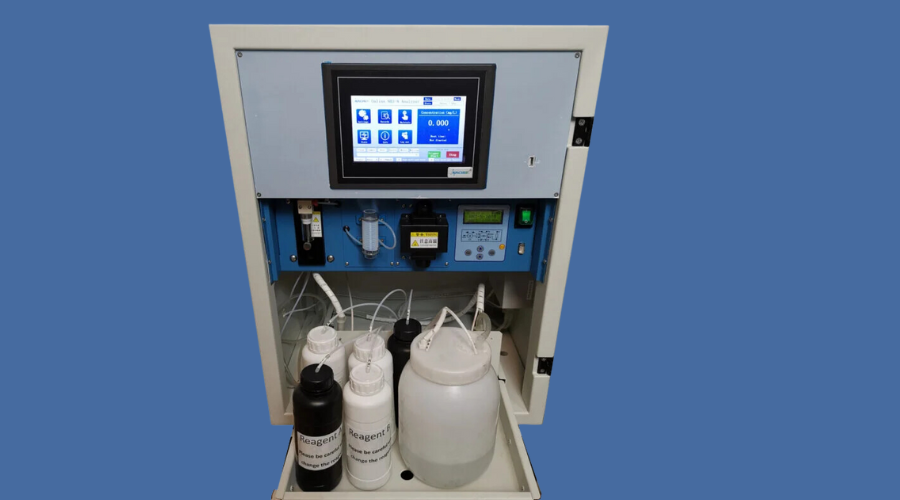 Welcome to Shanghai K&A Environmental Technology Co., Ltd website
Welcome to Shanghai K&A Environmental Technology Co., Ltd website
 Welcome to Shanghai K&A Environmental Technology Co., Ltd website
Welcome to Shanghai K&A Environmental Technology Co., Ltd website

Imagine your wastewater treatment plant as a bustling kitchen. A torrent of organic scraps – think leftover food, grease, and other yucky stuff – flows in every day. To ensure this culinary chaos doesn't overwhelm your pipes, you need a skilled chef or, in this case, a COD analyzer.
COD, or Chemical Oxygen Demand, measures organic pollution in water. It's like counting the dirty dishes piled up in your sink. The higher the COD, the more organic grime is lurking in the water. A COD analyzer is the detective who uncovers this hidden mess.
Imagine your wastewater as a mysterious, bubbling cauldron filled with hidden ingredients. You need a skilled alchemist to understand what's brewing in there. That's where the COD analyzer comes in.
This high-tech potion master doesn't sip the water like a wine connoisseur, but it does perform a magical transformation. It mixes the water with a unique chemical concoction, creating a bubbling brew under intense heat. This potent mixture is like a detective, breaking the organic compounds into simpler substances.
As the organic matter is dismantled, it consumes oxygen from the mixture. It's like a hungry monster devouring all the available food. The COD analyzer is a clever accountant, carefully tracking how much oxygen is gobbled up. The more oxygen consumed, the more organic matter was in the original water. It's like measuring the monster's appetite to determine the size of the feast!
The final result? A number that reveals the water's hidden organic load. It's like uncovering a secret recipe after careful analysis.
A COD analyzer is more than just a piece of equipment; it's the unsung hero of your wastewater treatment plant. Think of it as the plant's detective, constantly looking for clues about the water's condition.
Just as a master chef adjusts their recipe based on the ingredients, a wastewater treatment plant must adapt its processes to handle different wastewater compositions. A COD analyzer is the chef's tasting spoon, providing real-time feedback on the water's organic content. By analyzing these results, plant operators can fine-tune the treatment process, ensuring optimal performance and maximum efficiency. It's like having a sous chef constantly monitoring the soup, making sure it's seasoned to perfection.
Imagine a sudden influx of pollutants into your wastewater - it's like a surprise party, but with unwanted guests. A COD analyzer is the party crasher you want, quickly detecting these unexpected spikes. By identifying these pollution events early on, treatment plants can take immediate action to prevent environmental disasters. It's like having a guard dog that barks at intruders, giving you time to protect your property.

Environmental regulations are the recipe book for clean water. To avoid getting a culinary disaster, treatment plants must follow these guidelines precisely. A COD analyzer is the recipe inspector, ensuring the wastewater meets all the required standards. By monitoring the water quality closely, treatment plants can avoid costly fines and penalties. It's like having a strict but fair food critic who ensures your restaurant passes the health inspection.
There are different types of COD analyzers, each with its strengths:
Spectrophotometric analyzers measure the color change in a water sample after a chemical reaction. It's like comparing the color of your soup to a color chart.
Titrimetric analyzers involve adding a chemical solution drop by drop until the water changes color. It's like seasoning your food one pinch at a time.
Online analyzers: These continuously monitor wastewater, providing real-time data. It's like having a sous chef constantly tasting the soup.
COD analyzers might not be the most glamorous part of wastewater treatment, but they are undeniably important. They are the diligent workers behind the scenes, ensuring our water is clean and safe.
How often should I measure COD?
The frequency depends on factors like wastewater characteristics and treatment plant size. Generally, more frequent measurements provide better control.
Can I use a COD analyzer at home?
While portable COD analyzers are available, they are typically used for industrial or laboratory purposes.
What is the difference between COD and BOD?
Both measure organic pollution, but BOD focuses on the oxygen biological organisms use, while COD measures the total oxygen demand.
In conclusion, COD analyzers are essential tools for maintaining water quality. They are the wizard of wastewater treatment, working tirelessly to protect our environment.